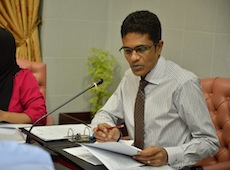The People’s Majlis voted 38-31 yesterday to grant a request by President Abdulla Yameen to reallocate 704 flats to Hulhumalé from a 1,500-housing unit project planned for four southern atolls.
MPs of the ruling Progressive Party of Maldives (PPM) and coalition partner Maldives Development Alliance (MDA) voted in favour while opposition Maldivian Democratic Party (MDP) MPs and Jumhooree Party (JP) MPs voted against the proposal.
On June 11, President Yameen asked parliament to review a decision by the 17th People’s Majlis in December 2013 to deny the president’s request.
The year before, the previous parliament had also denied his predecessor President Dr Mohamed Waheed’s request to revise the housing project to shift 704 housing units to Hulhumalé.
In December 2012, parliament rejected the proposed change with former Speaker Abdulla Shahid casting a tie-breaking vote after the vote was tied 33-33.
An MVR2.5 billion (US$162 million) loan was secured during the administration of former President Mohamed Nasheed in 2011 to construct 1,500 housing units in Gaaf Alif, Gaaf Dhaal, Fuvahmulah and Addu City.
In a letter seeking parliamentary approval for the revision – which was read out at the parliament sitting on July 2 – President Yameen stated that the government had conducted a “needs assessment” and determined that there was “no need at present” to build more than 796 housing units in the southern atolls.
Yameen also contended that “micro-level decisions regarding loans” should be made by the executive, adding that an affordable housing scheme was essential to develop Hulhumalé with a large enough population to provide education and healthcare services and create job opportunities.
Developing a ‘youth city’ in Hulhumalé with a population of 50,000 was a campaign pledge of President Yameen, whose vision for the artificial island includes the creation of light industries and a “technopolis” park as well as sports and entertainment facilities.
The president’s request was forwarded to the public accounts committee (PAC) earlier this month, which approved it over the objections of opposition MPs on the committee and sent a report (Dhivehi) to the Majlis floor for final approval. The report was compiled by the PAC of the previous parliament.
Pro-government MPs had rejected MDP MPs Ibrahim Shareef’s proposal to seek further information after summoning Housing Minister Dr Mohamed Muiz and voted in favour of a proposal by PPM MP Riyaz Rasheed to pass the previous report.
Parliamentary approval for revising the terms of a loan is required under amendments approved to the Public Finance Act in 2010.
Regional disparity
During the final debate on the report at Tuesday’s sitting, MDP MP for the mid-Hithadhoo constituency in Addu City, Ibrahim Mohamed Didi, alleged that the contractors stood to gain an additional US$21 million by shifting the flats to the Malé region.
“Who on the committee looked into what happens to this US$21 million?” the retired brigadier general asked, characterising the move as a “betrayal” of the people of the southern atolls.
He explained that the cost of a flat decreases from US$150,000 to US$75,000 when it is built in Hulhumalé.
Due to the low value of land outside the central region, Didi said people in the outer atolls were unable to secure housing loans and appealed to pro-government MPs to vote against the proposal on behalf of their constituents.
JP Leader Gasim Ibrahim also alleged “serious corruption” in tendering the construction work to a contractor as the cost of building a flat should not exceed US$75,000 on average.
Flats for tsunami victims in the south were built with loan assistance from the Saudi Fund and elsewhere for about US$50,000, he added.
The JP MP for Maamigili called for investigations by the Auditor General’s Office and Anti-Corruption Commission (ACC), questioning the US$150 million price tag for 1,500 flats.
Independent MP for Gaaf Dhaal Madaveli, Muaz Mohamed Rasheed, said his constituents were “very concerned” with the decision to reallocate the flats from the south.
If the flats are to be built in Hulhumalé, Muaz suggested that citizens of southern atolls should get preference in the awarding process.
However, despite the misgivings, Muaz said the government should be able to make revisions in the interests of loan repayment. While he attended yesterday’s sitting, Muaz did not participate in the vote.
PPM MP for Gaaf Alif Gemanafushi, Jameel Usman, noted that a large number of citizens from the atolls resided in the capital and were in need of housing, to whom President Yameen wished to provide low-cost housing.
MDA MP Ahmed Amir meanwhile cautioned that further delays caused by parliament could jeopardise the loan, which was secured on favourable terms at a “very low” interest rate.
The PPM-led government’s manifesto included land reclamation of several islands in the outer atolls, Amir said, where housing units would also be built.
A UNDP Human Development Index released last month highlighted regional disparities and inequalities in the Maldives as a “major challenge” towards human development.
“Where one is born within the Maldives determines many of the opportunities and choices available to a person,” the report concluded.

